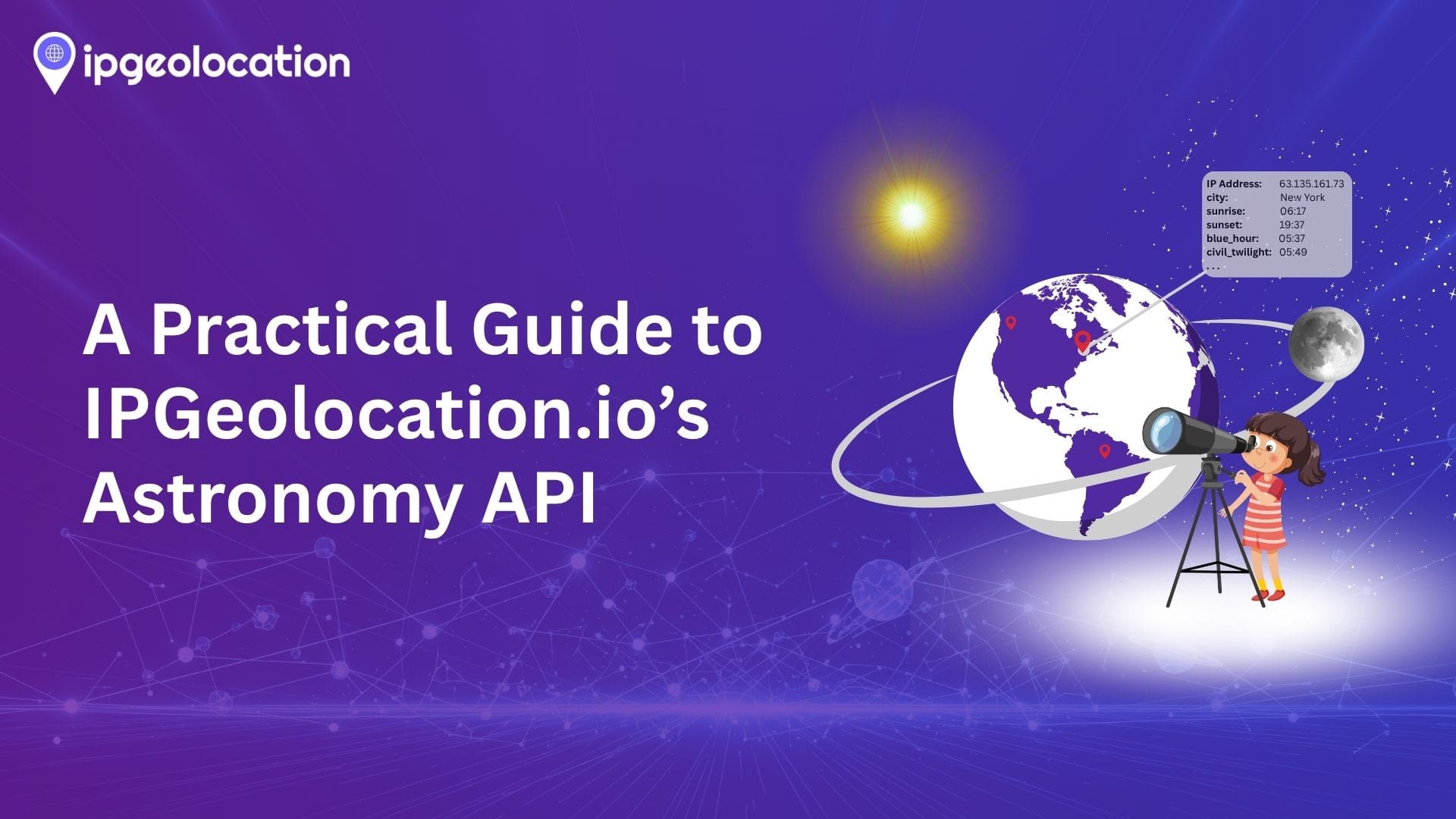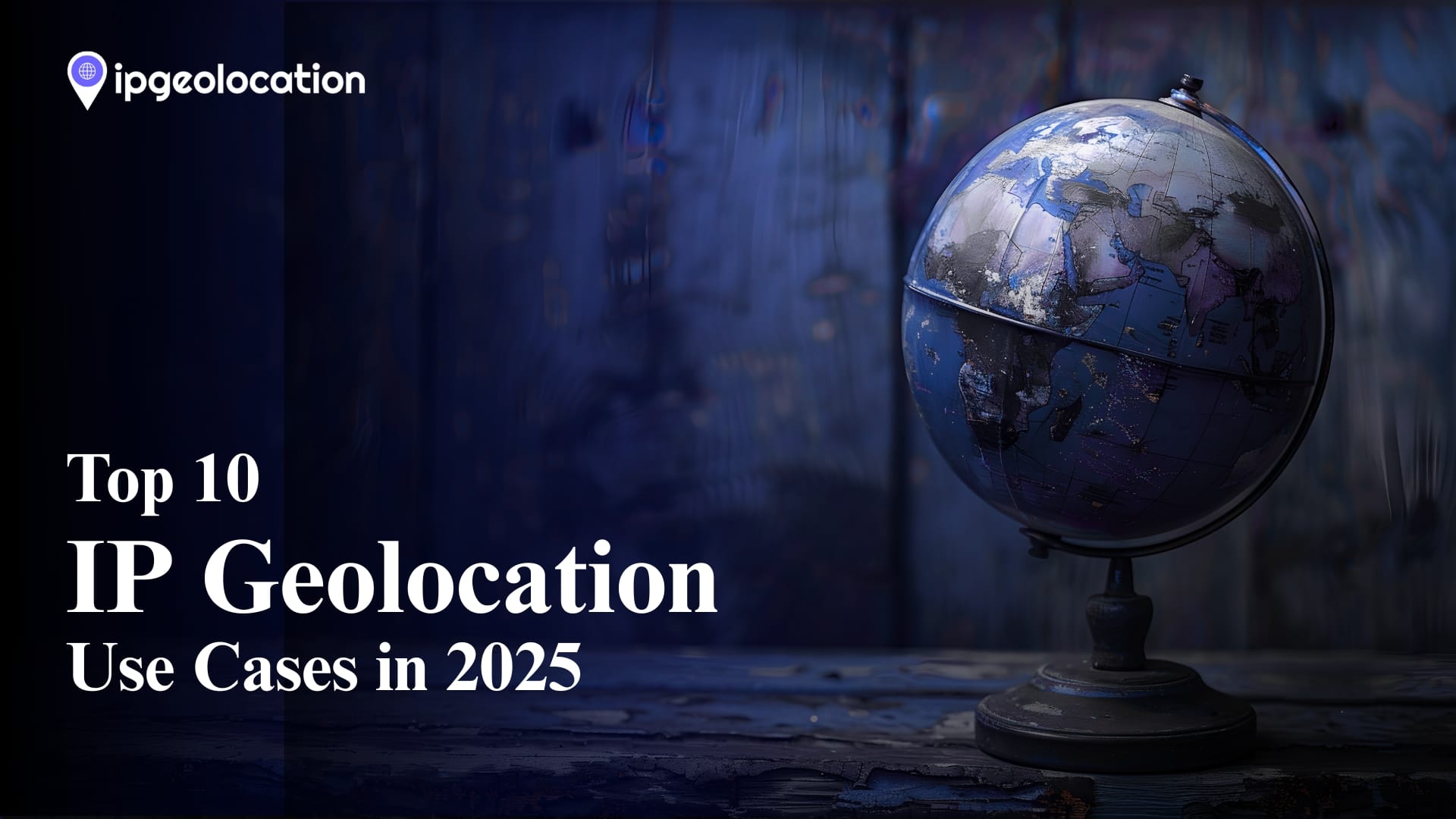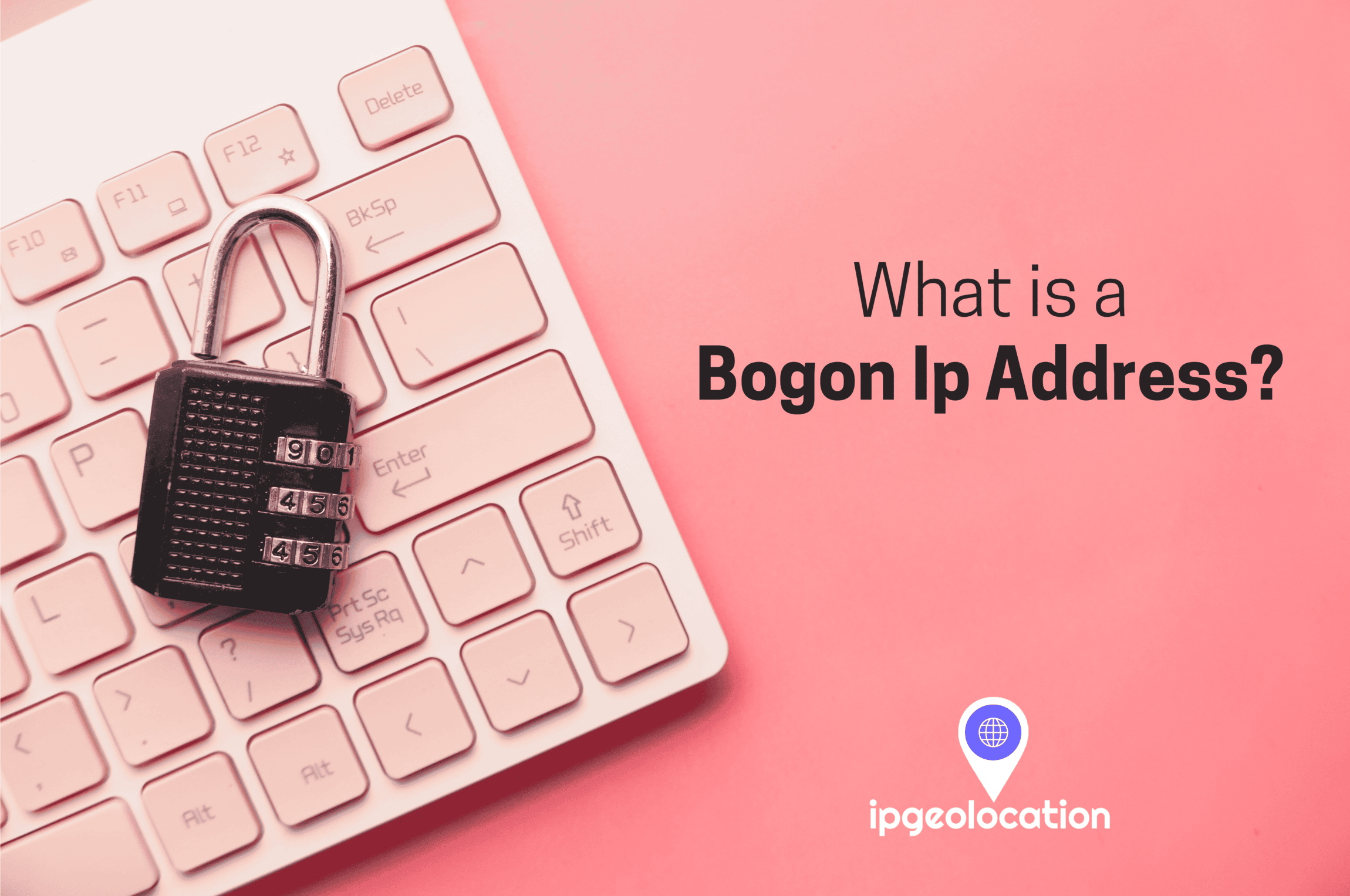Table of Contents
5 Companies Employing IP Geolocation for Success
IPGeolocation is a powerful tool that many successful companies use to improve their user experience and services by allowing them to automatically personalize content, enforce regional rules, improve the security of their content, and deliver a more relevant user experience by determining a user's location from their IP address. In this article, we’ll read about five real-world examples of companies using IP geolocation data for success to see what they do and the key lessons we can learn. By the end of this article, it will be clear that if giants like Netflix or Amazon gain huge value from geolocation, smaller companies can too, especially now that IP geolocation data is easily accessible via plug-and-play APIs (like the one from our ipgeolocation.io). Let’s dive in!
Streaming Giant (Netflix) – Content Localization Using IPGeolocation
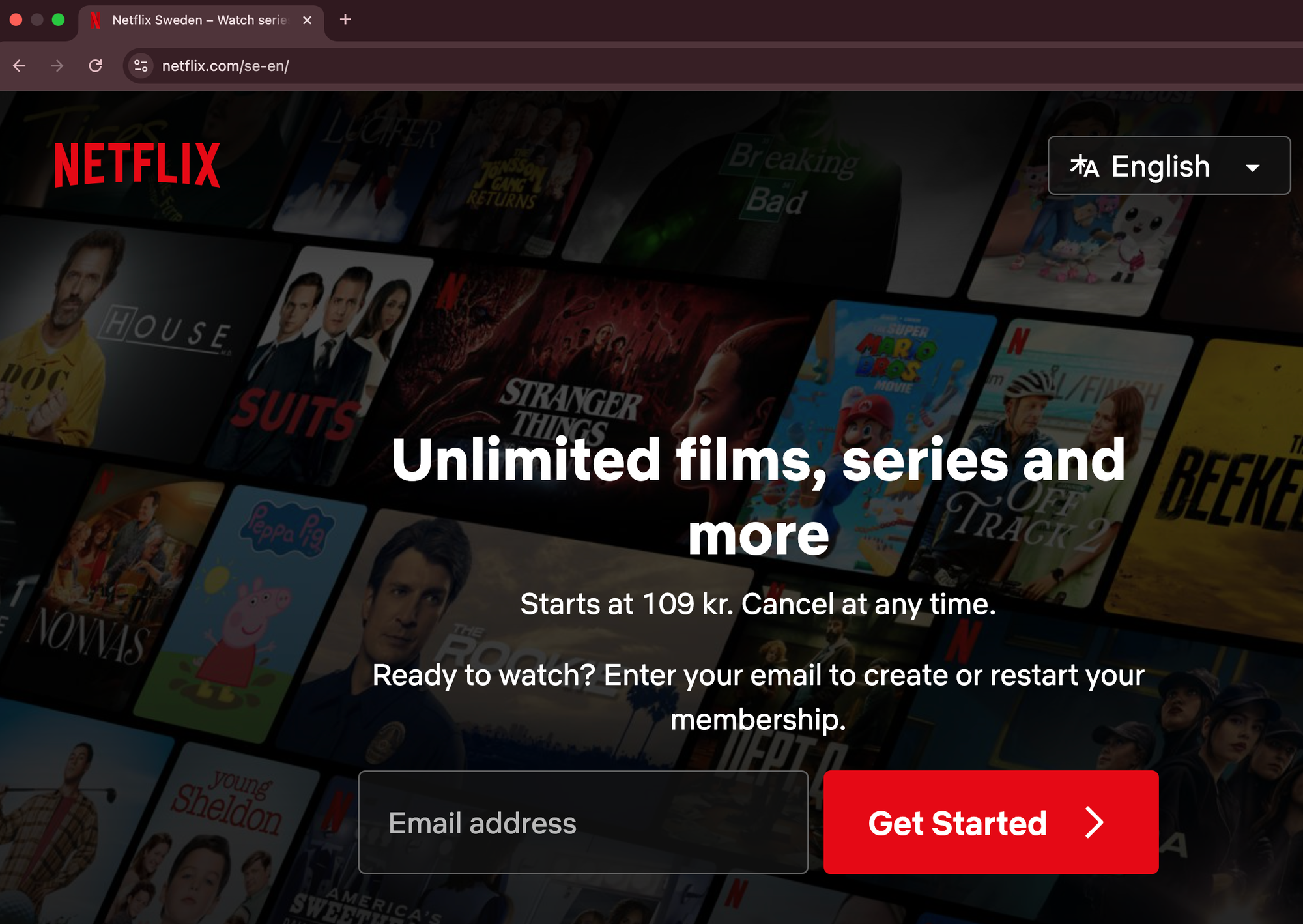
The streaming leader uses IP geolocation to comply with licensing agreements and show each user content available in their country. Netflix operates in over 190 countries with an enormous catalog, but due to complex content licensing deals, not every show or movie can be streamed everywhere. To handle these agreements and comply with local censorship laws, Netflix geo-restricts content. When you log in, it checks your IP address and shows you the catalog that is allowed and licensed for your region.
In practice, someone in the United States might see different titles than someone in France or Japan. Netflix even automatically redirects visitors to their country-specific page; for example, a user visiting Netflix from Sweden is taken to the Swedish Netflix site. This makes sure that you only see content you can actually watch in your location. By utilizing IP geolocation data, Netflix improves user experience while also ensuring compliance. Users aren’t teased with titles they can’t play; everything shown is immediately playable in their region.
It also helps Netflix to localize promotions and recommendations, for example, highlighting locally popular shows or providing subtitles and audio in the local language. The lesson here is that geolocation can enforce digital rights and personalize content to local tastes at scale. Nobody gets frustrated clicking on an unavailable video, because Netflix filters it out based on your IP. The result is higher user satisfaction and trust, all while meeting legal requirements.
Lesson: Use geolocation to deliver a region-appropriate experience. It keeps customers happy (with relevant content) and keeps your business safe by honoring licensing and regional rules.
E-commerce Leader (Amazon) – Personalized Shopping Experience

The e-commerce giant Amazon also uses IP geolocation data to reduce friction for international shoppers. If you visit Amazon, it immediately detects your country and changes the interface accordingly. One way Amazon does this is by notifying you if items can ship to your location or automatically redirecting you to the correct regional site. For example, if a user from Sweden opens Amazon.com, he will be prompted with a message like “We’re showing you items that ship to Sweden” (as seen above). This means you won’t spend time browsing a product only to find out at checkout it can’t be delivered to you (which is pretty frustrating), a huge dissatisfaction e-commerce sites aim to avoid.
Amazon also often pre-selects local settings like language and currency for the incoming shopper. Shoppers are subtly guided to their country’s Amazon site (or given a choice if they prefer another), and prices can be shown in the local currency by default . In fact, displaying prices in a customer’s currency is a proven best practice, as one study found that 76% of online buyers prefer to see product prices in their local currency, which helps them make a decision more quickly about a product. All these geolocation-driven tweaks add up to a seamless, personalized user experience.
By autodetecting location, Amazon removes friction that might otherwise cause a customer to drop off (such as confusion over currency or shipping or finding out at the checkout that the product can't be delivered to their provided address). Reducing this friction directly improves sales: global consumers are more likely to complete purchases when the site feels “made for them.”. Amazon’s ability to serve country-specific content without making the user hunt for it is one reason it successfully sells to customers worldwide without maintaining completely separate websites for every nation.
Lesson: The key takeaway for businesses is that IP geolocation can significantly boost conversion and global reach. By greeting users with localized content (correct country site, local deals, shipping info pre-filtered, etc.), you increase comfort and trust. This leads to more checkouts and happier customers. As Amazon’s example shows, investing in geolocation personalization is an investment in better UX and higher revenue.
Cybersecurity Firm (Cloudflare) – Threat Detection & Mitigation
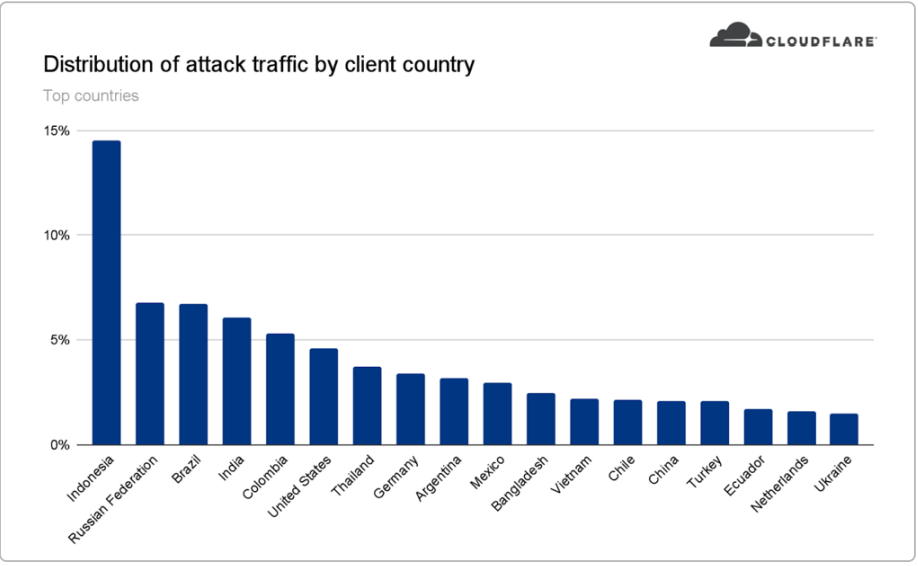
Cloudflare is a cybersecurity and CDN provider that uses IP geolocation extensively in its threat intelligence tools. The chart above shows one of Cloudflare’s reports on a massive DDoS cyberattack, breaking down the attack traffic by source country. In that incident, malicious traffic originated from 112 countries worldwide, with approximately 15% coming from Indonesia, followed by huge contributions from Russia, Brazil, India, and others. By identifying where traffic is coming from, Cloudflare’s systems can detect unusual patterns (e.g., a surge of requests from a country that a site typically does not serve) and take action.
Another use case where Cloudflare uses IP Geolocation data extensively is to allow website owners to geo-block or show a challenge to the traffic coming from a specific country or countries, if needed. This unique country-blocking feature allows you to block “bad traffic” at the source, allowing you to stop visitors from a specific country if you have nothing at all to offer them. For example, if a customer’s website is under attack predominantly from a specific region, Cloudflare can quickly isolate that region’s traffic, mitigating the attack while letting legitimate users from other regions through.
Cloudflare’s dashboard even shows a “Threats by Country” map in real time , so you can know where most attacks against your site are coming from. This helps in making decisions like enabling “Under Attack Mode” or blocking specific countries during an attack spike. Beyond DDoS, IP geolocation helps detect fraudulent or suspicious logins (many sites will flag if an account suddenly logs in from an unusual country) and block known malicious IP ranges. A study clearly shows that 42% of global web traffic is considered malicious or irrelevant bots, much of which can be filtered out by region-based rules.
Lesson: Whether it’s a CDN like Cloudflare segmenting traffic by region to contain an attack, or an app like Facebook alerting you to a login from a new country, the ability to pinpoint “where” adds an important layer of defense. For example, you can geo-block regions that are not your target market but are generating attacks or regular traffic (if you don't want them to reach your website), or you can ask your users to provide extra verification for access from high-risk locations or multiple logins from unrealistic travel locations.
Online Advertising (Facebook & Google) – Location-Targeted Ads
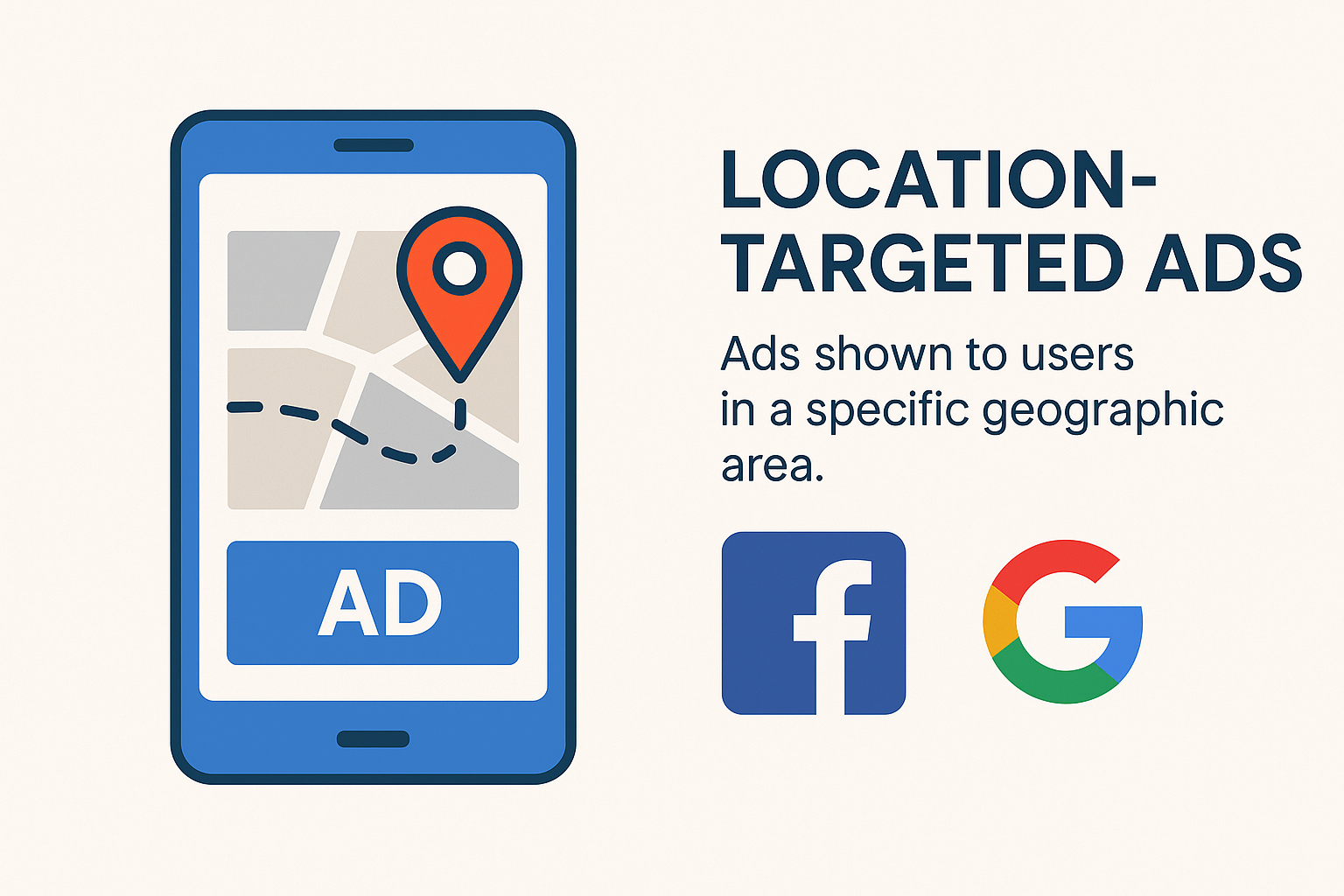
Online ad platforms like Facebook and Google Ads have turned location targeting into an art (and a science). These companies heavily utilize IP geolocation data to let advertisers target ads with incredible precision by geography. On Facebook, for example, a business can choose to show an ad only to users in specific countries, cities, or even a radius around a GPS point. If you run a local boutique in London, you can have your Facebook ads appear only to people within a 10-mile radius of downtown. Google Ads similarly allows location-based targeting and local search ads.
Why does this even matter? Because localized ads perform much better. People are far more likely to click an ad that is relevant to their location than a random piece of information in the form of an ad, such as a food delivery app showing “hot pizza in Paris – delivered in 30 minutes” to a user in Paris, versus a generic global ad. The data and studies support this: Approximately 67% of marketers claim that the primary benefit of location data is more precise ad targeting. In fact, one report noted that using Facebook’s location targeting smartly can improve ad conversions by up to 500% which is a massive difference in campaign ROI achieved simply by including geolocation in the strategy.
From the user’s perspective, location-based ads can be a win as well; they see promotions that make sense for them (No more seeing an ad for a service that isn’t even available in your country). Platforms like Google and Facebook know your IP-derived location (as well as your GPS location if you grant permission to the mobile or desktop app) and automatically show you ads and content specific to your region. Have you ever noticed how your Facebook feed might show local restaurant ads, or Google shows you nearby store locations? That’s geolocation at work. When you search for something on Google and scroll to the bottom of the page, you'll see a minimal yet powerful message that clearly indicates the search results are personalized according to your search patterns and region (See the image below).

By using IP Geolocation data, you can serve users ads that speak to their locale (using local language, currency, addresses, or simply relevance to their area), making them far more likely to engage. Higher relevance means higher click-through rates and better return on your ad spend.
Lesson: If you do any advertising or content targeting, use IP geolocation to localize your messaging and content. Whether it’s a global brand personalizing users' experience region by region or a small business zeroing in on the neighborhood, location-based targeting is a proven way to increase engagement and conversions.
SaaS/B2B Service – Compliance and Performance Optimization
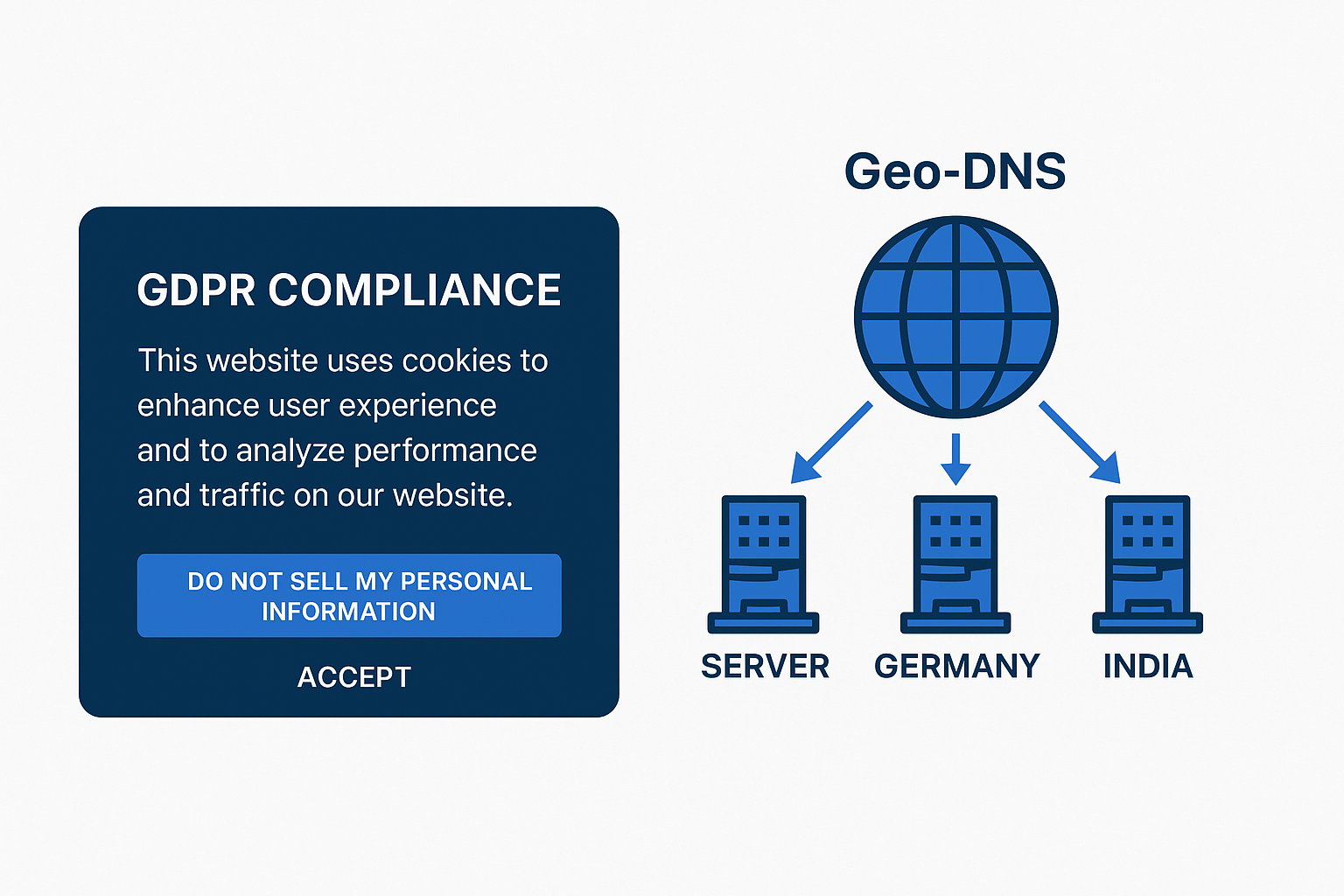
IP Geolocation technology is not only used in consumer-facing products; B2B and SaaS companies also use it extensively for regulatory compliance and performance optimization (we'll explore this further in the upcoming paragraphs). A great example is how SaaS providers handle data privacy laws like GDPR, because in the EU, GDPR imposes strict rules on user data, and non-compliance can lead to fines up to €20 million or 4% of global revenue (a nightmare for any organization). To resolve this, many SaaS platforms use IP geolocation to identify users from the EU (or other regions with specific laws) and act accordingly. For example, an HR software or analytics SaaS might detect that a visitor’s IP is from Germany and then automatically present a GDPR consent banner or different terms of service. At the same time, companies can show a different term of service or banner to a user from the US.
Another important use of IP Geolocation API and Databases in SaaS is for performance optimization. You would have noticed that for some major services, no matter where you make a request to their service, you'll always receive a response within a few milliseconds (such as the IPGeolocation.io API). These services usually deploy servers in multiple regions and use geolocation to route users to the nearest server or data center. This technique is sometimes referred to as geo-DNS or geolocation routing. For example, our IPGeolocation.io API service serves its customers with the least latency among its competitors by routing API requests from EU customers to servers in the EU (Frankfurt, London, etc.), while sending API requests from Asia-Pacific users to servers in Singapore or Tokyo. All of this is decided based on the user’s IP location at the time of their request.
Lesson: You can use ip geolocation data to serve customers from the best location and comply with local laws by default, show the proper consent forms, host data in the right place, and even personalize content based on country (e.g. show a maintenance notice at 3 AM user’s local time, not 3 AM your time). These moves can save you from legal trouble and performance headaches.
Technical Considerations in IP Geolocation
When companies implement IP geolocation, several technical factors must be carefully considered to ensure accuracy and reliability. One of the primary challenges is maintaining up-to-date and precise IP-to-geolocation databases, as the physical location associated with an IP address can change over time due to ISP practices or network reassignments. To address this, many platforms use crawlers to continuously update their databases, but this process must be managed efficiently to avoid overwhelming the system with excessive data.
Another key consideration is the ability of the geolocation platform to handle large volumes of requests in real time. Companies need solutions that are capable of delivering fast, accurate results without compromising the performance of their web applications or services. The choice of platform and API is also crucial, as different providers may offer varying levels of support for IPv4 and IPv6 addresses, as well as different methods for processing and returning geolocation data. By selecting robust, scalable platforms and keeping their databases current, companies can ensure their IP geolocation systems deliver reliable results at all times.
Data Collection and Validation
Accurate data collection and validation are at the heart of effective IP geolocation. Companies must rely on reputable sources for their geolocation data, such as trusted IP-to-geolocation databases, to ensure the information they use is both current and precise. The process of collecting this data should include automated tools, like IP address validation APIs, which can help detect and correct errors or inconsistencies quickly and efficiently.
However, automation alone isn’t enough—human review remains a critical step in the process to ensure the highest level of data quality. Regular audits and reviews help companies detect any anomalies or outdated information that automated systems might miss. Additionally, it’s essential for companies to ensure that their data collection and validation processes comply with all relevant regulations and standards, particularly those related to data privacy and protection. By combining reliable data sources, automated validation, and thorough human oversight, businesses can confidently use geolocation data to enhance their services and maintain regulatory compliance.
Key Lessons Recap

Let’s now summarize the key takeaways from these five companies using IP geolocation technology in any way they can:
Content Compliance & Localization (Netflix): IP Geolocation technology makes sure that users see content that’s allowed and licensed for their region and relevant to them. This increases customer satisfaction and ensures compliance by filtering content based on location.
Personalized User Experience (Amazon): Auto-detecting location enables you to reduce friction and enhance user experiences, with correct language, currency, and product availability displayed by default. You can greatly increase conversions and global sales by lowering these barriers for international users.
Stronger Security (Cloudflare): You can integrate geolocation in your security strategy to help you identify and block threats. Whether it’s geo-blocking high-risk regions or flagging logins from unusual locations, location data strengthens your defense and protects users.
Targeted Marketing ROI (Facebook/Google): Location-based targeting leads to better engagement because ads or content personalized to a user’s city, region, or country see higher click-through rates and conversions. This is why marketers attribute improved campaign performance to IP-based geolocation.
Compliance & Performance (SaaS/B2B): Geolocation allows you to automatically enforce regional policies (privacy consent, content rules) and route users to nearby servers. This keeps regulators happy and users delighted with faster, locally compliant service.
Conclusion
IP geolocation may have started as a “behind-the-scenes” technical concept, but as we’ve seen, it’s now at the forefront in delivering modern digital experiences. From Netflix localizing content for its 200 million+ subscribers, to Amazon streamlining the shopping experience for shoppers worldwide, to Cloudflare protecting websites by identifying malicious actors, location data is a common thread driving these successes. The big takeaway is that any size company can learn from these examples. If these giants can improve compliance, user experience, security, marketing, and performance through IP geolocation, so can you.
You don’t need a huge engineering team or a custom solution for this because services like our IPGeolocation.io API make it a plug-and-play solution. ipgeolocation.io offers a free IP geolocation API (1,000 requests per day at no cost) that returns rich IP geolocation data, including country, city, ZIP code, ISP, time zone, local currency, and more. With a simple API call, even a small website can instantly learn a visitor’s location and personalize content or decisions accordingly.
Not only that, our IP geolocation API and Databases offers increasing amounts of data as you move up in our customized tiered plans . Our IP security API informs you if a visitor to your website is using a VPN, Proxy, Bot, Tor, a known Attacker, or a spammer, along with their geolocation, ISP, and ASN information. It also tells you if an ip address (visitor) is from a cloud provider (which are usually malicious, as real users typically don't use cloud IPs). Then, our IP Geolocation advanced API provides in-depth ASN, Company, and Abuse information, along with precise geolocation, which has extensive use cases in cybersecurity (we'll discuss this further). The process is straightforward: Get an API key by signing up and start using it immediately (takes less than a minute).
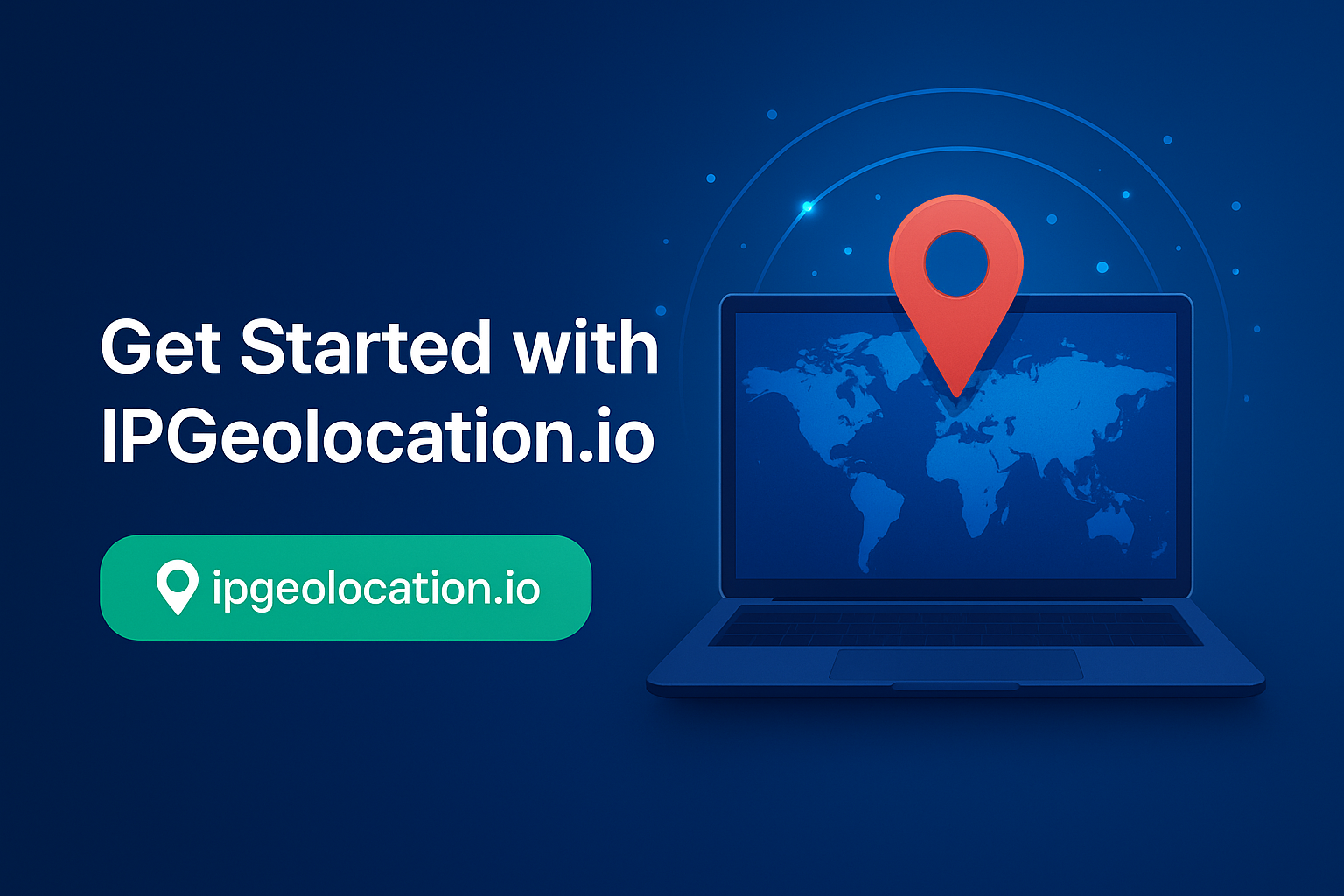
Subscribe Our Newsletter
Get the latest in geolocation tech, straight to your inbox.
Start for
Free
No Credit Card Needed
Access up to 1,000 requests/day with our forever free plan.
Sign Up Free









